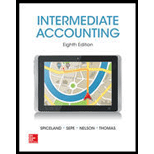
Requirement – 1
Performance obligation
Performance obligation is the promise made by the seller to supply the goods and service to the customer on or before the contract.
The revenue recognition principle
The revenue recognition principle refers to the revenue that should be recognized in the time period, when the performance obligation (sales or services) of the company is completed.
To discuss: The manner in which S Company’s 1997 “bill-and-hold” strategy might have contributed to artificially high earnings in 1997.
Requirement – 2
To discuss: The manner in which the strategy have led to the unusually high
Requirement – 3
To discuss: The manner in which the S Company’s 1997 bill-and-hold strategy might have constituted to a 1998 earnings decline.
Requirement – 4
To discuss: The manner in which the earnings management affects earning quality.
Want to see the full answer?
Check out a sample textbook solution
Chapter 5 Solutions
Intermediate Accounting w/ Annual Report; Connect Access Card
- Can you help me solve this general accounting question using the correct accounting procedures?arrow_forwardQuestion 5 of 11 Your answer is partially correct. 8.87/14 E ! Here are selected 2027 transactions of Riverbed Company. Jan. 1 June 30 Dec. 31 Retired a piece of machinery that was purchased on January 1, 2017. The machine cost $63,000 and had a useful life of 10 years with no salvage value. Sold a computer that was purchased on January 1, 2024. The computer cost $40,300 and had a useful life of 5 years with no salvage value. The computer was sold for $15,100 cash. Discarded a delivery truck that was purchased on January 1, 2023. The truck cost $33,780. It was depreciated based on a 6-year useful life with a $3,000 salvage value. Journalize all entries required on the above dates, including entries to update depreciation on assets disposed of where applicable. Riverbed Company uses straight-line depreciation. (Assume depreciation is up to date as of December 31, 2026.) (List all debit entries before credit entries. Credit account titles are automatically indented when amount is…arrow_forwardI need help solving this general accounting question with the proper methodology.arrow_forward
- Can you explain the correct methodology to solve this general accounting problem?arrow_forwardwork Question 6 of 11 Pronghorn Company, organized in 2025, has the following transactions related to intangible assets. 1/2/27 Purchased patent (8-year life) $592,000 4/1/27 *Goodwill (indefinite life) 375,000 7/1/27 Acquired 10-year franchise; expiration date 7/1/2037 520,000 9/1/27 Incurred research and development costs 178,000 4.74/14 E *The goodwill resulted from the purchase of a small company for cash in the amount of $750,000. At the time of acquisition, the fair value of the assets totaled $1,850,000, and the fair value of the liabilities totaled $1,475,000. (a1) Your answer is partially correct. Prepare the necessary entries to record these intangibles. All costs incurred were for cash. Make the adjusting entries as of December 31, 2027, recording any necessary amortization and reflecting all balances accurately as of that date. (List all debit entries before credit entries. Credit account titles are automatically indented when amount is entered. Do not indent manually.…arrow_forwardHii, Tutor Give answerarrow_forward
- CH 20 Master Budgets Extra Credit 6 Required information Part 2 of 2 3.35 points Saved Problem 20-2A (Algo) Manufacturing: Cash budget and schedule of cash payments LO P2 [The following information applies to the questions displayed below.] Built-Tight is preparing its master budget. Budgeted sales and cash payments follow: Budgeted sales July $ 56,500 August $ 72,500 September $ 55,500 Budgeted cash payments for eBook Direct materials Direct labor Overhead 15,660 3,540 19,700 12,940 2,860 16,300 13,260 2,940 16,700 Ask Print References Mc Graw Hill Help Save & Exit Submit Sales to customers are 20% cash and 80% on credit. Sales in June were $54,000. All credit sales are collected in the month following the sale. The June 30 balance sheet includes balances of $45,000 in cash and $4,500 in loans payable. A minimum cash balance of $45,000 is required. Loans are obtained at the end of any month when the preliminary cash balance is below $45,000. Interest is 1% per month based on the…arrow_forwardDanbury Processing combines corn husks and methanol. After joint manufacturing costs of $4,200 have been incurred, the mixture separates into two products, cellulose fiber and methyl esters. At the split-off point, cellulose fiber can be sold for $8,300, and the methyl esters can be sold for $12,700. The cellulose fiber can be further processed at a cost of $9,100 to make biodegradable packaging, which could be sold for $21,500. The methyl esters can be further processed at a cost of $7,800 to make biodiesel, which could be sold for $18,900. What is the net increase (decrease) in operating income from biodegradable packaging?arrow_forwardWhich of the following is true about the statement of cash flows?a) It shows the profitability of the businessb) It shows how cash is generated and used in operating, investing, and financing activitiesc) It is prepared only at year-endd) It does not include cash transactions from financing activitiesneed help!arrow_forward
- Which of the following is true about the statement of cash flows?a) It shows the profitability of the businessb) It shows how cash is generated and used in operating, investing, and financing activitiesc) It is prepared only at year-endd) It does not include cash transactions from financing activitiesarrow_forwardCan you help me solve this financial accounting question using the correct financial procedures?arrow_forwardWhich of the following is a characteristic of current assets?a) They are expected to be used or converted into cash within one yearb) They include long-term investmentsc) They are not liquidd) They represent debts the company must payexplainarrow_forward
 Auditing: A Risk Based-Approach (MindTap Course L...AccountingISBN:9781337619455Author:Karla M Johnstone, Audrey A. Gramling, Larry E. RittenbergPublisher:Cengage Learning
Auditing: A Risk Based-Approach (MindTap Course L...AccountingISBN:9781337619455Author:Karla M Johnstone, Audrey A. Gramling, Larry E. RittenbergPublisher:Cengage Learning

